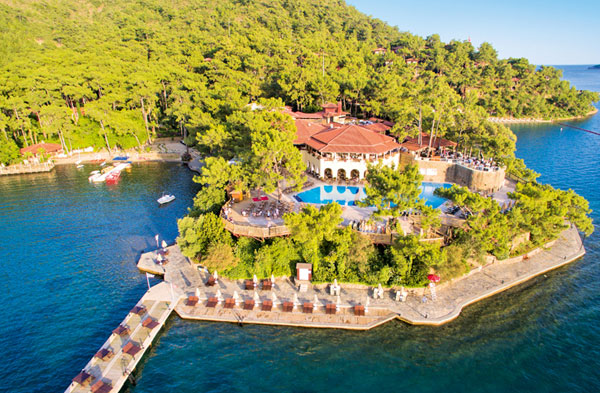✕

Column: industry Tag: TUI Blue,hotel brand,TUI Hotels Published: 2017-10-30 14:28 Source: Author:

One of TUI Blue’s pipeline properties is the TUI Blue Marmaris, which opens in Turkey in spring 2018. (Photo: TUI Group)
HANOVER, Germany—TUI Blue, the flagship hotel brand of Anglo-German firm TUI Group under its TUI Hotels & Resorts division, has done much to reinvent the parent company as not just a tour operator, but as a hotel operator.
TUI Blue was established in late 2014, and its portfolio includes hotels in Austria, Germany, Italy, Turkey, Spain, and its latest opening along the Croatian coast, the 161-key TUI Blue Jadran, which opened for business in July.
With tour-operated or package-holiday options so popular with travelers in Europe, TUI Blue might be seen to be a new, more direct revenue stream for TUI Group, but Managing Director Artur Gerber said this is not the case.
TUI also owns a family resort brand Robinson and all-inclusive resort brand TUI Magic Life, but TUI Blue is its first in-house, developed brand operating under the TUI brand name.
Operating hotels is not new for TUI, though, according Gerber, who joined the company in February 2015.
“Since the ‘70s we have had the RIU brand, for more than 40 years,” Gerber said.
Gerber said TUI Blue developed from strategic discussions surrounding the desire for a lifestyle brand.
“For us it is very important to differentiate ourselves from other tour operators,” Gerber said, who added the parent company considered it important to have the name TUI in the brand name.
“The TUI name is advantageous. It brought the brand a lot of attention from the press,” he said.
One concern was how a standalone brand would be perceived by TUI Group’s customers. Gerber said the brand garnered direct traffic, but that it also was sold as part of packages or through tour operators.
“It is sold differently in different countries,” he said. “In Germany through travel agencies, in Austria via direct bookings, where the brand already is well-known. In both those countries, hotels are half-board, also in Croatia, where we want guests to discover the country. Our two Turkish hotels see much demand from the (United Kingdom) and have great demand for all-inclusive packages. Ultimately, we created TUI Blue to offer what we saw demand for.”
Homemade branding
TUI Group also owns an airline, with a few former brands as of 2 October all rebranded as TUI Airways, and three cruise companies with a combined fleet of 16 cruise liners, Gerber said.
In October, the parent company finished a two-year repositioning where all travel brands formerly under its TUI AG and TUI Travel PLC divisions merged under the TUI Group umbrella.
Gerber said the TUI Blue brand is 100% owned and operated by TUI Group, but the business model—like the brand’s demand base—for its hotels also is and will continue to be varied.
“We own hotels, we have lease contracts, and we have management contracts,” he said. “Franchises might be for the future, but we created the brand with the idea and the clear target to operate them. That said, we would never own all of them, as it is important to have a balance for risk reasons.”
Gerber added scale is always important when entering a new market, but TUI Group’s ownership and interests in RIU, Robinson and Magic Life already have created that in guests’ eyes.
“TUI has had a long-lasting partnership with RIU, a 50% joint venture for many years, and there are other partnerships, but at the end of the day 50% of TUI Group’s profits are generated by our own hotels and cruise product,” Gerber said. “TUI Blue already is a strong driver.”
RIU, founded in Mallorca in 1953 as a family-run business, owns 3% of the stake capital of TUI, which itself acquired a stake in RIU in 1976.
Robinson was founded in the 1970s in a joint venture with Steigenberger Hotels & Resorts, now known as Deutsche Hospitality. Today, TUI Group fully owns Robinson.
TUI also owns several country subsidiaries, such as Nordotel in Spain, and has other joint ventures, such as with Atlantica Hotels, Barut Hotels and Grupotel, whose assets are all on the Mediterranean.
Out into the TUI Blue
One piece TUI Blue does not have is a guest loyalty program, Gerber said.
“We have plans to do something, but at the time being we do not see not having one in place as being a disadvantage,” Gerber said. “We want to make TUI Blue a very well-known brand, and there are a lot of individual things we can do to have guests stay loyal to it.”
To improve brand awareness, in 2018 TUI Blue will debut in Mallorca, Portugal and Tunisia, as well as adding its third property in Turkey, the TUI Blue Marmaris.
The Tunisian asset on the island of Djerba comes as a very welcome boost for a popular destination that saw tourism dwindle following a terrorist attack in Sousse in June 2015.
A new property also is planned for Austria, Gerber said.
That Austrian asset will double the number of TUI Blue hotels in that country, which along with one German asset in the north of that country are the only TUI Blue hotels not in Mediterranean countries or in the Canary Islands.
“There are others in the pipeline, and lots in review, in Asia and Caribbean, places our main source markets of Germany, Scandinavia and the U.K. want to travel to,” Gerber added.
Previous:How brands play into the deals equation
Next:Trisara’s Lark brought his passion to paradise
Hot key words
Hot Products
Popular Vendors